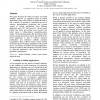Free Online Productivity Tools
i2Speak
i2Symbol
i2OCR
iTex2Img
iWeb2Print
iWeb2Shot
i2Type
iPdf2Split
iPdf2Merge
i2Bopomofo
i2Arabic
i2Style
i2Image
i2PDF
iLatex2Rtf
Sci2ools
157
Voted
ACSC
2005
IEEE
2005
IEEE
The Effect of Context and Application Type on Mobile Usability: An Empirical Study
This paper discusses the effect of context on mobile usability, proposes an expanded model of mobile application context, and conducts an empirical study to test a number of hypotheses concerning the use of software implementation technology and location context in mobile applications. Four different application types (PC web based, PC device based, mobile web based and mobile device based) were tested using a within-subjects repeated-measures design. The results demonstrate that by utilising client side processing and location context, the mobile device based application is able to achieve objective performance and subjective usability measures comparable to those of the PC based versions, despite the limited input and display capabilities of the mobile device. Conversely, the mobile web based application, which was unable to take advantage of location context or client-side application code, showed the lowest quantitative performance.
Related Content
| Added | 24 Jun 2010 |
| Updated | 24 Jun 2010 |
| Type | Conference |
| Year | 2005 |
| Where | ACSC |
| Authors | Caspar Ryan, Atish Gonsalves |
Comments (0)

